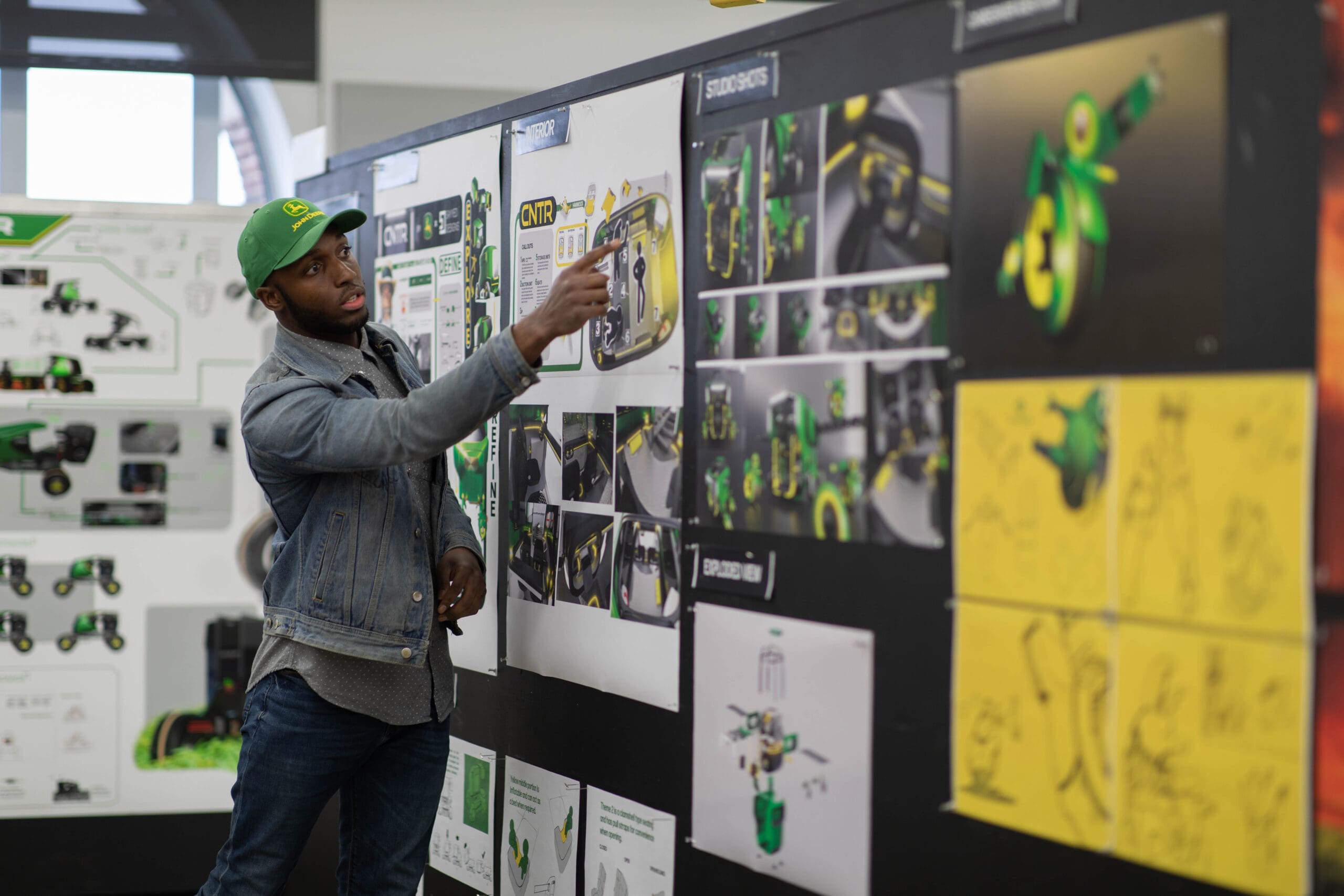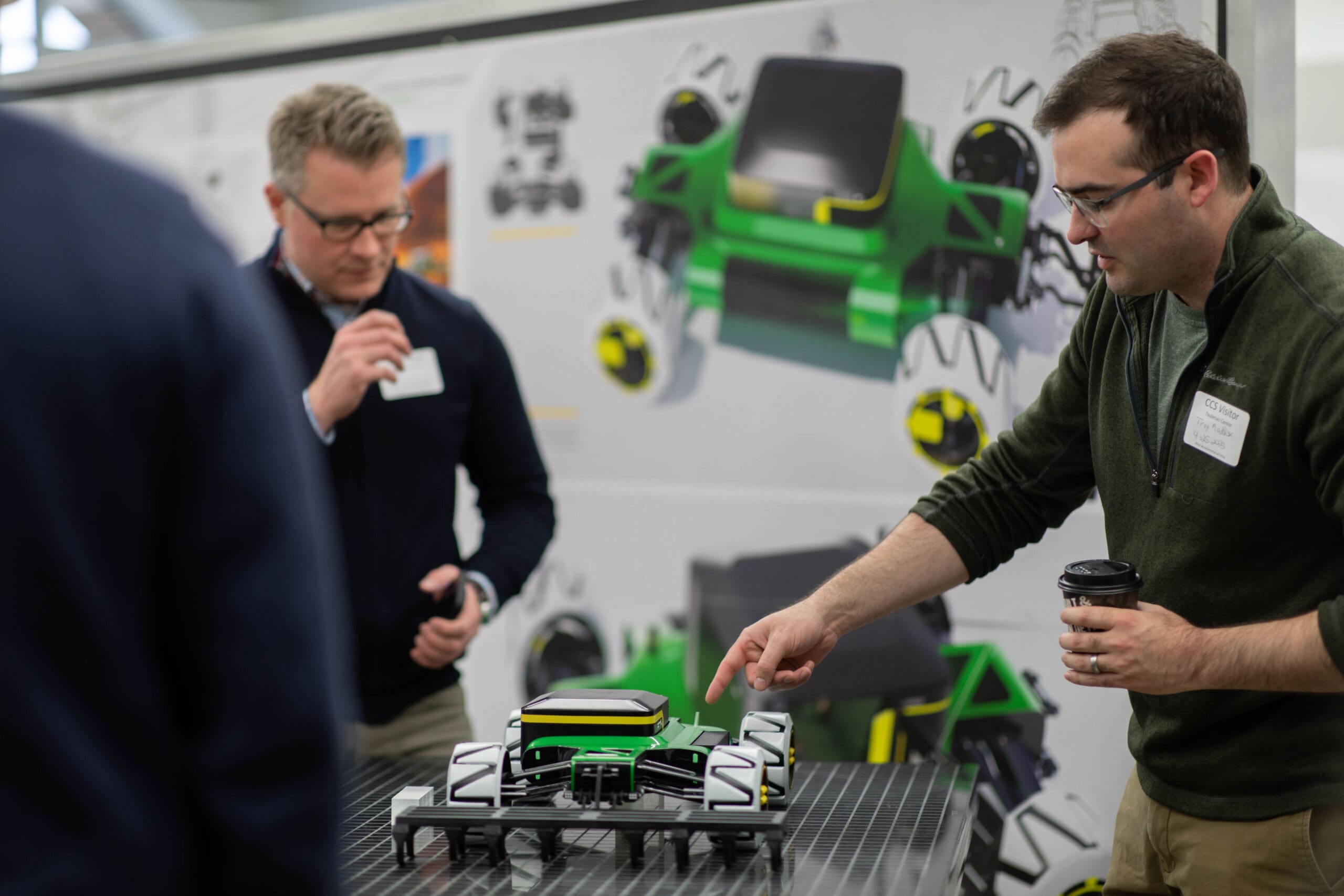CCS’s Transportation Design Students Envision the Future of Farming with John Deere Sponsored Project
June 30, 2023
This educational partnership with John Deere was part of a CCS initiative focusing on experiential learning, which assists with the preparation for life after graduation.
The world’s population is expected to grow from around 8 billion to nearly 10 billion people by 2050, increasing the global food demand by 50%. Farmers — less than 1% of the population — are feeding 100% of us. Without them, we don’t eat. There is tremendous pressure to feed this growing population and John Deere and their customers are uniquely positioned to lead the charge.
If farmers are going to feed more people on less land, operations must be more sustainable and efficient, for both environment and farmers’ livelihoods.
No stranger to innovation, John Deere was founded in 1837 by a blacksmith who developed the first commercially successful steel plow. The same company continues to revolutionize farming, not only addressing the needs of today’s farmers but anticipating those of future generations.
So what does farming look like 50 to 100 years from now? How can we adapt our farming needs for a changing climate and planet? Considering things like AI and machine learning, automation, autonomy, and alternative fuels, what does a more advanced, connected or self-sufficient machine look like?
These are the types of profound questions John Deere asked a group of CCS Transportation Design students to contemplate.
During the Winter semester, Transportation Design Professor Thomas Roney guided students with the task of creating and presenting their thought-provoking work to John Deere. From innovations for harvesting, meeting population growth, and cultivating in non-traditional environments on Earth and beyond, the students conjured a myriad of solutions for the food production challenges forecasted for the future.
Senior Transportation Design student Ben Mosley III looked to the stars for inspiration and created a hydroponic agricultural system.
“I came across an article about the future of space travel that essentially stated the first humans could be on Mars within the next few decades. After reading this article, and many others it began to make me think, how could human life be sustained long-term on a planet so far away from Earth? After further research I found that traditional farming methods would not be a viable solution. To make this project work, I needed to think outside the box. I couldn’t just design a standalone vehicle, I needed to design a system.”
Ben designed a hydroponic agricultural system that eliminated the use of soil, using nutrient-infused water mixes to grow crops. The John Deere St-V is the face of the system – a heavy-class rover designed to handle the harsh Martian terrain. The vehicle was inspired by the anatomy of grasshoppers, which translated for Ben into a fully articulating suspension that allows it to hug any surface it touches. Crops grown in vertical farms could be harvested and then prepared for transit in the John Deere St-V to a nearby colony.
Jason Cherry, Creative Director and Brand Identity Manager at John Deere, views collaborations like this as critical to pushing traditional boundaries.
“We have phenomenal ground-breaking innovators, engineers, and designers within our own walls. And we work with an extraordinary network of world-class suppliers. Engaging with incredible talent to solve tomorrow’s problems is in our DNA. I’m excited to see this next generation of leaders help carry the torch, purposefully innovating practical — and beautiful — design solutions.”
Troy Maddox, Lead Industrial Designer at John Deere, added, “We’re solving real-world problems. Using the machines we design and build, our customers provide food, fuel, fiber, and infrastructure for the world. Designing something that helps move the world forward is design on a whole different level. One of the students from the program is interning with us this summer. And we hope to repeat the collaboration again this fall, focused on new challenges and opportunities.”
This educational partnership with John Deere was part of a CCS initiative focusing on experiential learning, which assists with the preparation for life after graduation. It provides students with opportunities to gain practical skills through hands-on experiences with faculty, peers, industry, and community partners.



